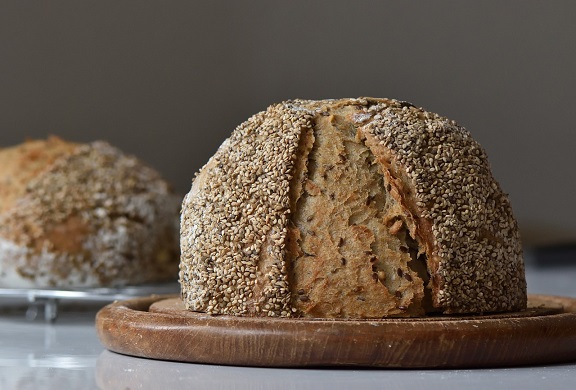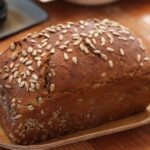
With its robust flavor and dense, chewy crumb, Roggenbrot – German Rye Bread – is a cornerstone of traditional German baking. Darker and heartier than wheat-based loaves, Roggenbrot offers a tangy complexity thanks to its high rye content and, often, a sourdough starter.
Whether sliced for sandwiches or enjoyed with butter and cheese, Roggenbrot is the bread of choice for those who appreciate bold, rustic flavor and a loaf that stays fresh for days.
The Origins of Roggenbrot
Roggenbrot has deep roots in northern and eastern Germany, where rye grows more reliably than wheat. For centuries, it was the daily bread of rural communities, offering sustenance and long shelf life. In regions like Brandenburg, Saxony, and parts of Bavaria, it remains a pantry essential.
This bread is traditionally baked in large round or oval loaves, often in wood-fired ovens. Its slightly sour taste comes from the natural fermentation of rye flour – a process deeply ingrained in German baking culture.
Want to explore more rye-rich recipes? Check out our Vollkornbrot – Whole Grain Bread and Bauernbrot – Farmer’s Bread guides.
Ingredients & Preparation (Step-by-Step Recipe Guide)
Ingredients for Authentic Roggenbrot
- 400 g (3¼ cups) rye flour
- 100 g (¾ cup) bread flour
- 1 packet (7 g) dry active yeast (or 100 g sourdough starter)
- 350–375 ml (1½ cups) warm water
- 1 tbsp honey or molasses
- 2 tsp salt
- 1 tsp caraway seeds (optional)
- 1 tbsp vinegar
- Flour for dusting
Optional tools: Banneton (proofing basket), Dutch oven or baking stone, kitchen scale
How to Make Roggenbrot (Step-by-Step Instructions)
Step 1: In a bowl, mix warm water, yeast (or starter), and honey. Let sit for 10 minutes until foamy.
Step 2: In another bowl, combine rye flour, bread flour, salt, and caraway seeds. Mix dry and wet ingredients together.
Step 3: Add vinegar and knead into a sticky, elastic dough. Let rise in a covered bowl for 1-2 hours, until doubled.
Step 4: Punch down and shape into a round loaf. Place into a floured proofing basket or parchment-lined bowl. Let rise again for 30-45 minutes.
Step 5: Preheat oven to 230°C (450°F). If using a Dutch oven, place it inside to preheat as well.
Step 6: Turn the dough onto a baking sheet or into the Dutch oven. Score the top and bake for 10 minutes. Lower temperature to 200°C (390°F) and bake for another 35-40 minutes.
Step 7: Let cool completely before slicing to allow the crumb to set.
Tips:
- Rye dough is sticky – knead gently and avoid over-flouring.
- Use steam for a crisp crust (place a pan of water in the oven).
- For a tangier flavor, use a rye sourdough starter and let it ferment overnight.
Serving Suggestions & Variations
How to Serve Roggenbrot
Roggenbrot pairs well with strong cheeses, pickled vegetables, and smoked meats. It’s often used for open-faced sandwiches (Brotzeit) or as a base for spreads like liverwurst or quark.
Toast it lightly for breakfast or serve alongside hearty soups and stews for a classic German touch.
Variations & Regional Twists
- Sourdough Roggenbrot: Use a rye starter and longer fermentation.
- Frankenlaib: A Franconian specialty with spelt and a pronounced crust.
- Seeded Rye: Add sunflower, pumpkin, or flax seeds for texture and nutrition.
Roggenbrot is the essence of traditional German bread baking – earthy, nourishing, and full of flavor. With a little practice, you can create a loaf that’s both rustic and refined, perfect for every day or as a showpiece on your table. Ready to rise to the challenge? Take the German Bread Quiz.
For more authentic German breads, browse our German Bread Recipes collection and take your kitchen back to its roots.







